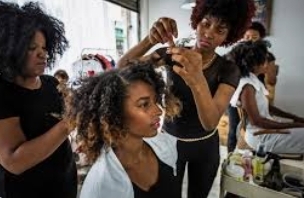How to Start a Hair Salon Business in Nigeria: Starting a hair salon business in Nigeria can be an exciting and rewarding venture.
The beauty industry in Nigeria is thriving, with a growing demand for high-quality hair care services. However, like any business, careful planning and execution are essential for success.
In this article, we will provide a detailed guide on how to start a hair salon business in Nigeria, covering various aspects such as market research, location selection, equipment and supplies, staff recruitment, marketing strategies, and legal requirements.
Recommended: How to Start Pig Farming in Nigeria
How to Start a Hair Salon Business in Nigeria
Market Research:
Before starting a hair salon business, it is crucial to conduct thorough market research. Identify your target market, analyze competition, and understand consumer preferences and trends. This will help you position your salon strategically and offer services that cater to the needs of your potential customers.
Business Plan:
Develop a comprehensive business plan that outlines your salon's vision, mission, target market, pricing strategy, marketing plan, financial projections, and growth strategies. A well-structured business plan will serve as a roadmap for your salon's success and help attract potential investors or secure funding.
Location Selection:
Choosing the right location is vital for the success of your hair salon. Look for areas with high foot traffic, preferably in commercial districts or residential neighborhoods with a target customer base. Consider factors such as accessibility, parking facilities, competition, and the overall ambiance of the area.
Equipment and Supplies:
Invest in high-quality salon equipment and supplies to provide exceptional services to your clients. Some essential items include hair styling chairs, shampoo stations, hair dryers, cutting and styling tools, hair products, towels, and salon furniture. Research suppliers, compare prices, and choose reliable vendors to ensure a smooth supply chain.
Staff Recruitment and Training:
Hire skilled and experienced hairdressers, stylists, and salon staff who are passionate about their work. Conduct interviews, check references, and assess their proficiency in various hair care techniques. Additionally, invest in continuous training to keep your team updated with the latest trends, styles, and customer service skills.
Salon Design and Ambiance:
Create a welcoming and aesthetically pleasing environment in your salon. Consider factors such as salon layout, interior design, lighting, and comfortable seating arrangements. The ambiance should align with your brand and create a relaxing experience for your customers.
Marketing and Promotion:
Develop a comprehensive marketing plan to raise awareness and attract customers to your hair salon. Utilize both online and offline marketing channels, including social media platforms, local advertising, influencer collaborations, and partnerships with complementary businesses. Offer promotional discounts, loyalty programs, and referral incentives to encourage repeat business and word-of-mouth referrals.
Legal Requirements and Licensing:
Ensure compliance with all legal requirements and obtain the necessary licenses and permits to operate a hair salon in Nigeria. Register your business with the Corporate Affairs Commission (CAC) and seek guidance from relevant regulatory bodies, such as the National Agency for Food and Drug Administration and Control (NAFDAC), if you plan to sell hair care products.
Conclusion:
Starting a hair salon business in Nigeria requires careful planning, attention to detail, and a passion for the beauty industry. By conducting thorough market research, developing a comprehensive business plan, choosing the right location, investing in quality equipment, hiring skilled staff, creating a welcoming ambiance, implementing effective marketing strategies, and complying with legal requirements, you can set a strong foundation for your salon's success.
Remember to continuously adapt to changing trends and customer preferences to stay competitive in the thriving Nigerian beauty industry.

